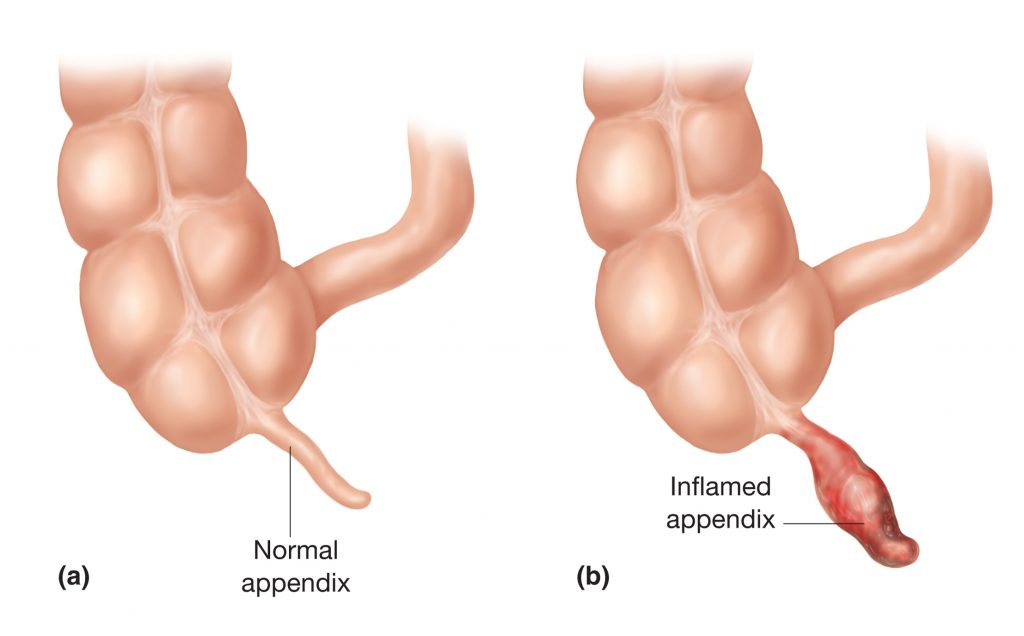
Appendicitis is a sporadic disease, and only a handful of people experience it in their lifetimes. Although most people have denied the severity of the condition, it can eventually be harmful. Therefore, it is necessary to keep a check on the symptoms.[1] If you notice any of it soon, you need to go to a doctor.
Depending on the severity of the condition, appendicitis can be both chronic and acute. Most people tend to ignore it. But, the more you ignore it, the more it will become harmful for you. Appendicitis is considered to be one of the most common reasons for pain around the lower abdomen.
Appendicitis shouldn’t be ignored because if left untreated, it will grow, thereby reaching a stage where it will burst. Eventually, the bacteria will get into your abdominal cavity, thereby leading to a more severe and fatal condition. It is essential to be aware of the symptoms, diagnosis, and treatment of the condition so that you can avoid the problem soon.
Symptoms of appendicitis
Many people complain that they don’t notice any symptoms. Well, the symptoms only become visible or noticeable after a specific time. People who have appendicitis are likely to suffer from the following symptoms.
- Sharp pain around the belly button and upper abdomen
- Pain around your abdomen on the right side
- Nausea
- Indigestion
- Diarrhea
- Not able to pass gas
- Mild or severe fever
- Nausea
- Frequent vomiting
- Abdominal swelling
The first symptoms of appendicitis is a slight pain around the belly button. It starts off with mild pain but grows on to become severe with time[2]. Mostly, the pain starts in the upper abdomen before proceeding to the lower one.
Most of the time, constipation is also a sign of appendicitis. Therefore, if you suspect that you are prone to appendicitis, you need to avoid the use of laxatives and proceed with an enema. Using laxatives can lead to your appendix to burst.[3]
Pain around the right side of your abdomen is considered to be a huge sign. If you notice it, you need to consult your doctor as soon as you. However, make sure to check for the other symptoms as well. If not taken care of properly, appendicitis can be one of the most significant medical emergencies.
What causes appendicitis?
The causes of appendicitis have varied from time to time. Since no confirmed cause is known yet, experts suggest that blocking or obstruction around the appendix is one of the most common reasons.[4]
But what blocks your appendix? These include
- Enlarged lymphoid follicle
- Traumatic injury
- Tumors
- The buildup of hardened stool
- Intestinal worms
The blockage of the appendix can lead to the multiplication of the bacteria, which leads to the accumulation of pus and swelling. This puts up a painful pressure around your abdomen, which can prove to be harmful.
Will the doctor carry out an ultrasound?

It depends on the doctor. If the doctor notices that you are prone to appendicitis, they will carry out an abdominal ultrasound.[5] Apart from that, they will also be checking for abscess, inflammation, and other symptoms that are usually found in patients who have appendicitis.
Apart from ultrasound, the doctor will also carry out imaging tests such as CT scans. They mostly use high frequency sounds to capture the image of your organs. In a CT scan, the doctors use radiation to get a clear view of your organs.
But, being exposed to radiation has its own health risks, which is why doctors prefer avoiding it. The imaging test, as well, is accompanied by several health risks.
Do kids suffer from appendicitis?
Yes. More than thousands of kids around the world are suffering from appendicitis. Although appendicitis is mostly detected in the age group of 15-30, sometimes kids can develop it too.[6]
Teenagers usually develop appendicitis pain around their novels. This is often ignored as mere stomach ache, which is why the condition can get dangerous in kids. If you find your child to be complaining about pain in the right abdomen, it is time that you get your child tested for appendicitis.
Apart from this, the child may also show other symptoms such as
- Frequent vomiting
- Nauseating
- Mild to severe fever
- Loss in appetite
Appendicitis and Pregnancy
Pregnant women are very rarely prone to acute appendicitis. This is one of the most common causes of non-obstetric emergencies. Since it also causes pain around the belly, the symptoms are usually neglected as mild discomfort during pregnancy.[7]
Pregnancy can even lead to an appendix’s upward movement around the abdomen. This can make it hard for doctors to diagnose the condition.
Surgery is considered to be one of the easiest ways to get rid of appendicitis in pregnant women. If it is not much severe, the pregnant woman is also given antibiotics to avoid any negative impact on the child. Delayed diagnosis can, however, be harmful as it can increase the risk of complications in pregnancy.[8]
Surgery
Depending on your severity, the doctor will conduct a surgery referred to as an appendectomy, in which the appendix is removed. Often appendix bursts, which is why the doctors make sure to clean up the abdominal cavity as well. The doctors also conduct laparoscopy. Apart from that, the doctor will also perform open surgery to remove the appendix.[9]
Apart from surgery, slight changes in diet and lifestyle are also recommended. It is often advised to reach out to medical health professionals before bringing any change in your diet. Your nutritionist and doctor can be of great help in finding out the solutions.
[1] https://www.ncbi.nlm.nih.gov/books/NBK493193/
[2] Khan MS, Chaudhry MBH, Shahzad N, Tariq M, Memon WA, Alvi AR. Risk of appendicitis in patients with incidentally discovered appendicoliths. J. Surg. Res. 2018 Jan;221:84-87. [PubMed
[3] https://www.ncbi.nlm.nih.gov/pmc/articles/PMC4259213/
[4] Addiss DG, Shaffer N, Fowler BS, et al. The epidemiology of appendicitis and appendectomy in the United States. Am J Epidemiol 1990;132:910–925. [PubMed] [Google Scholar]
[5] Carr NJ. The pathology of acute appendicitis Ann Diagn Pathol 2000;14:46–58. [PubMed] [Google Scholar]
[6] Vaos G, Dimopoulou A, Gkioka E, Zavras N. Immediate surgery or conservative treatment for complicated acute appendicitis in children? A meta-analysis. J. Pediatr. Surg. 2019 Jul;54(7):1365-1371. [PubMed]
[7] https://www.ncbi.nlm.nih.gov/pmc/articles/PMC1562475/
[8] Larner AJ. The aetiology of appendicitis. Br J Hosp Med 1988;39: 540-2. [PubMed] [Google Scholar]
[9] Andersson R. Meta-analysis of the clinical and laboratory diagnosis of appendicitis. Br J Surg 2004;91: 28-37. [PubMed] [Google Scholar]

